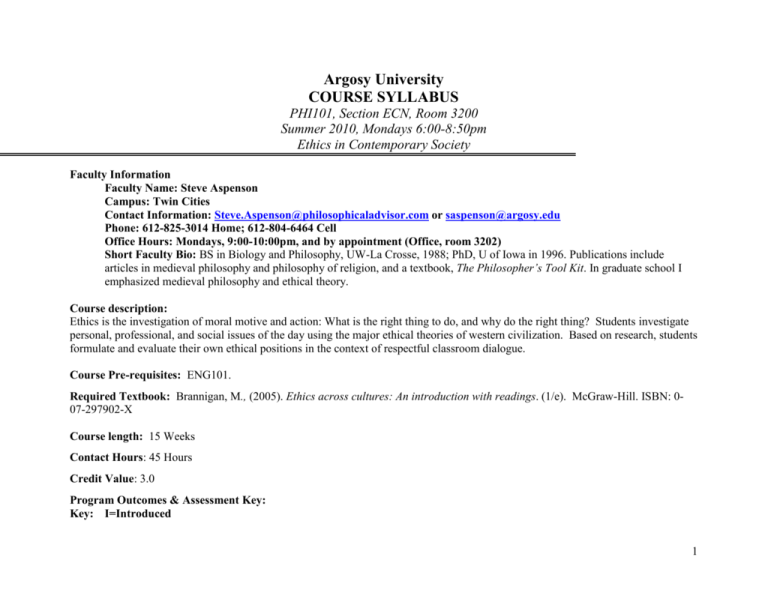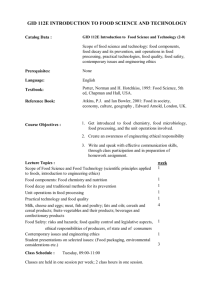Argosy University - PhilosophicalAdvisor.com
advertisement

Argosy University COURSE SYLLABUS PHI101, Section ECN, Room 3200 Summer 2010, Mondays 6:00-8:50pm Ethics in Contemporary Society Faculty Information Faculty Name: Steve Aspenson Campus: Twin Cities Contact Information: Steve.Aspenson@philosophicaladvisor.com or saspenson@argosy.edu Phone: 612-825-3014 Home; 612-804-6464 Cell Office Hours: Mondays, 9:00-10:00pm, and by appointment (Office, room 3202) Short Faculty Bio: BS in Biology and Philosophy, UW-La Crosse, 1988; PhD, U of Iowa in 1996. Publications include articles in medieval philosophy and philosophy of religion, and a textbook, The Philosopher’s Tool Kit. In graduate school I emphasized medieval philosophy and ethical theory. Course description: Ethics is the investigation of moral motive and action: What is the right thing to do, and why do the right thing? Students investigate personal, professional, and social issues of the day using the major ethical theories of western civilization. Based on research, students formulate and evaluate their own ethical positions in the context of respectful classroom dialogue. Course Pre-requisites: ENG101. Required Textbook: Brannigan, M., (2005). Ethics across cultures: An introduction with readings. (1/e). McGraw-Hill. ISBN: 007-297902-X Course length: 15 Weeks Contact Hours: 45 Hours Credit Value: 3.0 Program Outcomes & Assessment Key: Key: I=Introduced 1 R=Reinforced A=Applied 1. Student has demonstrated ability to acquire, evaluate, apply and communicate information by 1.1 Using efficient research methods, both traditional and electronic, R 1.2 Reading for comprehension, analysis and evaluation, I,R 1.3 Using information to support their ideas and their purposes, I,A 1.4 Communicating to specific audiences, both orally and through writing, information they have gathered, R,A 2. Student has demonstrated ability to employ analytical skills and to solve problems by 2.2 Analyzing a problem and providing a solution or an accurate commentary, R 2.3 Recognizing and articulating ethical situations and developing responsible solutions, I, R, A 3. Student has demonstrated knowledge of history and human endeavor by 3.1 Recognizing and appreciating major contributors to their field of study, I 3.2 Understanding the impact of major technical and social advances on their fields of study, I,R 3.3 Articulating and understanding the ethical framework which supports their actions and attitudes in their field of study, I,R,A 4. Student has demonstrated knowledge of diversity in human culture and behavior by 4.1 Applying interpersonal skills in problematical situations, R Course Objectives: At the end of this course students will be able to 1. Apply the basic terminology used in the field of logic and philosophic ethics (Program Outcome(s): 1.4) 2. Describe the three major normative theories of moral reasoning along with the philosophers primarily responsible for advancing them. (Program Outcome(s): 1.2, 1.4, 3.1) 3. Identify the social and historical forces that contributed to the development of the three major normative ethical theories. (Program Outcome(s): 3.1, 3.2) 4. Using comparative and case study analysis, identify the strengths and weaknesses of the three major normative theories: (Program Outcome(s): 2.2, 2.3) 5. Evaluate contemporary moral arguments from non-philosophic sources. (Program Outcome(s): 1.3, 2.2, 2.3) 6. Using basic critical thinking skills, describe the essential factual and value components of contemporary moral dilemmas. (Program Outcome(s): 2.2, 2.3, 4.1 7. Evaluate contemporary and historic moral arguments using the three major normative ethical theories. (Program Outcome(s): 1.3, 1.4, 2.2, 2.3, 3.1, 3.2, 3.3, 4.1) 2 8. Construct original ethical arguments utilizing the three major normative ethical theories. (Program Outcome(s): 1.1, 1.3, 1.4, 2.2, 2.3, 3.3, 4.1) Assignment Table Module Module Topics 1 Introduction to the three major normative theories Readings Course schedule: Virtue Ethics Consequentialism Ethics Deontological Ethics Assignments See course Schedule for any assignments Logic Basic Terms: Statement Argument Validity Soundness Brannigan: Chapter 2 "Critical Thinking and Moral Reasoning" Basic Argument structures: Modus Ponens Chain Argument Dilemma Basic Fallacies Affirming the consequent Begging the question 2 Relativism & Egoism Basic Terms & Concepts Cultural Relativism Ethical Relativism Psychological Egoism Ethical Egoism Social Contract Theory Brannigan: Chapter 1 "The Case for Cultural Diversity" Hobbes: “Leviathan” 3 Basic Terms & Concepts Social Contract State of Nature Limits of enforceable moral laws Analysis & Application Theoretical strengths Theoretical weaknesses Challenge of civil disobedience Contemporary Examples 3 Ancient & Virtue Ethics Basic Terms & Concepts: Virtue/Vice Golden Mean Happiness The Good Role Modeling Analysis & Application Theoretical strengths Theoretical weaknesses Contemporary examples 4 Religious Ethics, Augustine or Aquinas & World Religions Basic Terms & Concepts Divine Command embedded document (public domain). Hobbes Excerpts 97-03.doc Brannigan: "General Assembly of the United Nations, The Universal Declaration of Human Rights." Article Stanford Encyclopedia of Philosophy on Egoism: http://plato.stanford.ed u/entries/egoism/ Brannigan: Ch.3 "Aristotle, Teleology, and Virtue" article "Aristotle from Nichomachean Ethics Books I & II” article PHI101 Aristotle Reading Assignment.doc Brannigan: Chapter 3 "Aquinas and the Natural Law" article 4 Theory Problem of Evil Analysis & Application Theoretical strengths Theoretical weaknesses Connections to Aristotle’s Virtue Ethics Comparative analysis with non-Western religious system 5 6 Consequentialist Ethics Basic Terms & Concepts Happiness Greatest Happiness Principle Moral Point of View Act Utilitarianism Rule Utilitarianism Instructor selected readings from Brannigan: “Part III: Quest for Universal Moral Standards and Other Traditions” Aquinas: 10 to 20 pages (25005000 words) of selections of the Instructor’s choosing http://www2.nd.edu/De partments/Maritain/ete xt/gc.htm Brannigan: Chapter 5 "Mill and Utilitarian Ethics” Analysis & Application Theoretical strengths Theoretical weaknesses Cost/Benefit analysis Contemporary Examples 5 7 Deontological Ethics Basic Terms & Concepts Dignity Ends/Means distinction Duty Rationality Hypothetical vs. Categorical Imperative Brannigan: Chapter 4 (with the exception of Billy Budd) "Kant's Deontology” Contemporary Ethical Issue Case Study Analysis & Application Theoretical strengths Theoretical weaknesses Contemporary Examples 8 Feminist Ethics Basic Terms & Concepts Ethics of Care Feminist Critiques of Normative Theories Brannigan: Chapter 6 "Feminist Ethics" Analysis & Application Theoretical strengths Theoretical weaknesses Contemporary Examples 6 Grading Criteria Grading Scale A AB+ B BC+ C CD+ D DF 100 – 93 92 – 90 89 – 88 87 – 83 82 – 80 79 – 78 77 – 73 72 – 70 69 – 68 67 – 63 62 – 60 59 and below Grading requirements Participation / Discussion Quizzes (6) 15% 40% Midterm paper Final Paper 20% 25% 75pts 40pts each; throw out low score; 200pts 100pts 125pts To pass the course you must attend at least 67% of classes, take 5 of 6 quizzes, and turn in both papers. 7 Library: All resources in Argosy University’s online collection are available through the Internet. The campus librarian will provide students with links, user IDs, and passwords. Library Resources: Argosy University’s core online collection features nearly 21,000 full-text journals and 23,000 electronic books and other content covering all academic subject areas including Business & Economics, Career & General Education, Computers, Engineering & Applied Science, Humanities, Science, Medicine & Allied Health, and Social & Behavior Sciences. Many titles are directly accessible through the Online Public Access Catalog at http://library.argosyu.edu. Detailed descriptions of online resources are located at http://library.argosyu.edu/misc/onlinedblist.html. In addition to online resources, Argosy University’s onsite collections contain a wealth of subject-specific research materials searchable in the Online Public Access Catalog. Catalog searching is easily limited to individual campus collections. Alternatively, students can search combined collections of all Argosy University Libraries. Students are encouraged to seek research and reference assistance from campus librarians. Information Literacy: Argosy University’s Information Literacy Tutorial was developed to teach students fundamental and transferable research skills. The tutorial consists of five modules where students learn to select sources appropriate for academic-level research, search periodical indexes and search engines, and evaluate and cite information. In the tutorial, students study concepts and practice them through interactions. At the conclusion of each module, they can test their comprehension and receive immediate feedback. Each module takes less than 20 minutes to complete. Please view the tutorial at http://library.argosyu.edu/infolit/ Academic Policies Academic Dishonesty/Plagiarism: In an effort to foster a spirit of honesty and integrity during the learning process, Argosy University requires that the submission of all course assignments represent the original work produced by that student. All sources must be documented through normal scholarly references/citations and all work must be submitted using the Publication Manual of the American Psychological Association, 5th Edition (2001). Washington DC: American Psychological Association (APA) format. Please refer to Appendix A in the Publication Manual of the American Psychological Association, 5th Edition for thesis and paper format. Students are encouraged to purchase this manual (required in some courses) and become familiar with its content as well as consult the Argosy University catalog for further information regarding academic dishonesty and plagiarism. 8 Scholarly writing: The faculty at Argosy University is dedicated to providing a learning environment that supports scholarly and ethical writing, free from academic dishonesty and plagiarism. This includes the proper and appropriate referencing of all sources. You may be asked to submit your course assignments through “Turnitin,” (www.turnitin.com), an online resource established to help educators develop writing/research skills and detect potential cases of academic dishonesty. Turnitin compares submitted papers to billions of pages of content and provides a comparison report to your instructor. This comparison detects papers that share common information and duplicative language. Americans with Disabilities Act Policy It is the policy of Argosy University to make reasonable accommodations for qualified students with disabilities, in accordance with the Americans with Disabilities Act (ADA). If a student with disabilities needs accommodations, the student must notify the Director of Student Services. Procedures for documenting student disability and the development of reasonable accommodations will be provided to the student upon request. Students will be notified by the Director of Student Services when each request for accommodation is approved or denied in writing via a designated form. To receive accommodation in class, it is the student’s responsibility to present the form (at his or her discretion) to the instructor. In an effort to protect student privacy, the Department of Student Services will not discuss the accommodation needs of any student with instructors. Faculty may not make accommodations for individuals who have not been approved in this manner. The Argosy University Statement Regarding Diversity Argosy University prepares students to serve populations with diverse social, ethnic, economic, and educational experiences. Both the academic and training curricula are designed to provide an environment in which students can develop the skills and attitudes essential to working with people from a wide range of backgrounds. 9







